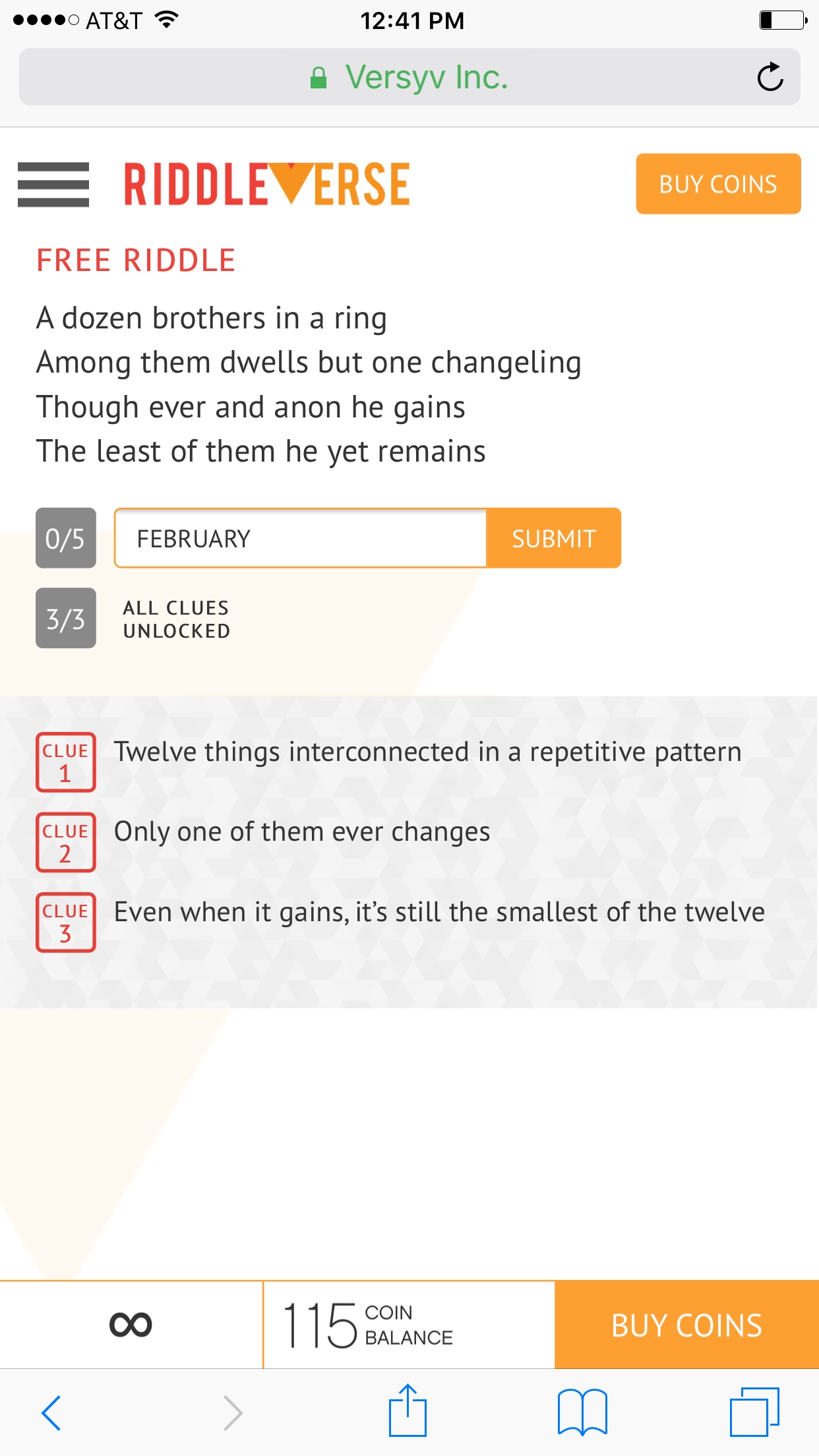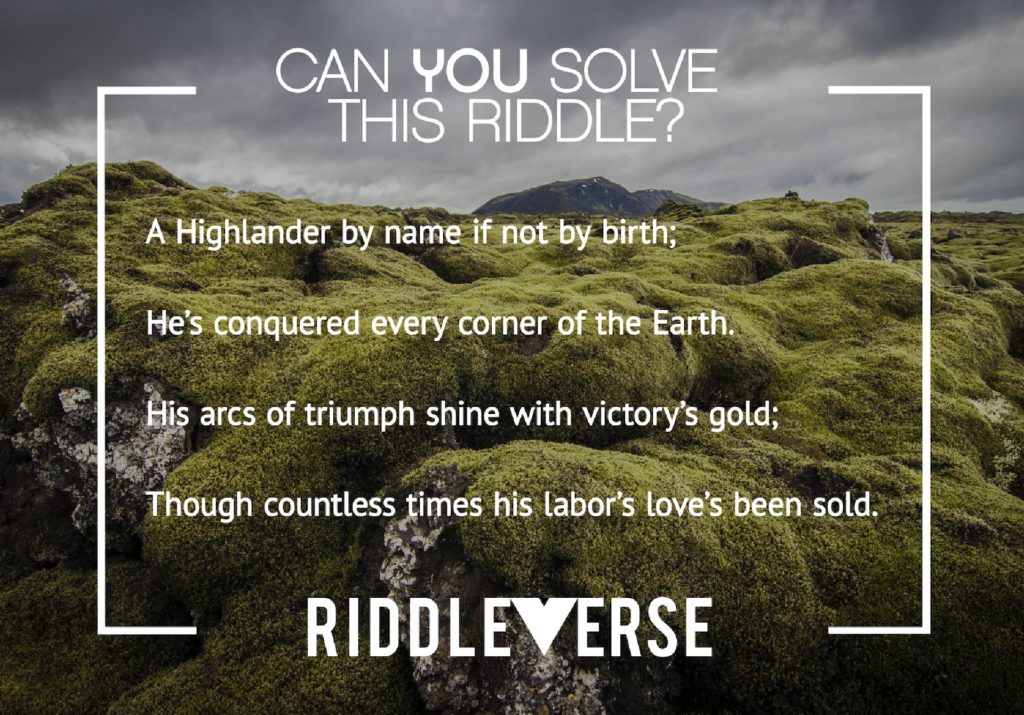Today, Versyv unveiled its new and unique skill-based contest: RiddleVerse. Part game and part cash prize contest, RiddleVerse challenges players to answer custom written riddles in the shortest amount of time, but these aren’t your ordinary run-of-the-mill riddles. Inspired by the works of J.R.R. Tolkien, they’re presented in metered rhyme. Players can compete daily to win part of a $5,000 prize pool. First prize is $2,000, second prize is $1,000, the third is $500 and so on.
Versyv CEO, Andrew Gladney, has a personal hand in the creation of every riddle, guaranteeing that there are no esoteric answers, and its subjects are widely known in American culture. He further states that each riddle uses regular English and that the rhyming verse “adds more focus and makes it more compelling.”
RiddleVerse will be accessible through the web and an iOS app this summer, with an Android app to release sometime after launch. Andrew Gladney and Versyv CMO, Dan Norcia, sit down with [a]listdaily to discuss the creation and promotion of the platform. Of course, they began by first providing a riddle to tease our brains.
“A dozen brothers in a ring;
Among them dwells but one changeling.
Though ever and anon he gains,
The least of them he yet remains.”

What is RiddleVerse, and what inspired it?
Andrew: RiddleVerse came into being as a sort of literary pursuit that developed over years. I was a voracious reader in my childhood, read a lot of English poetry, and studied English in college. So, I developed an affinity for rhyming verses. At one point in time, I became very interested in the works of J.R.R. Tolkien, who wrote a series of riddles in his book, The Hobbit, which are asked back-and-forth between Gollum and Bilbo. These riddles are of a particular genre. We call them “riddles in rhyming verse,” and I think Tolkien set the initial construct for these—a riddle describing something, but written eloquently. That’s what differentiates from the, “what’s black and white and red all over?”-type of riddles more Americans are culturally familiar with.
At some point, I began to craft a few of my own. The hobby became almost an obsession, and I kept writing until I had a big collection of riddles. Over time, I got to thinking about how to share them with the world, and what sort of platform I could put them on. I started with the idea of publishing them in a book, but with the high-tech world we all live in, people advised me that it would be better for an app. Different elements were added until we had a clear vision of what we wanted to do with these riddles. It’s such a great experience to read them and try to guess them that we thought we would “gamify” it, and put it into a platform where hundreds of thousands of will be able to enjoy them and compete against each other for prizes.

How will you separate RiddleVerse from regular riddle apps, and how have you been promoting awareness of the experience?
Dan: We have a few different points of contact with potential customers; one is working through our PR firm, TriplePoint. We also have some partnership plans in the works, and we’re having a few conversations with some distribution sources. We’re planning on doing some fairly aggressive performance marketing and use all the social media channels, such as Twitter and Facebook.
That’s the plan. We think there’s going to be a fair amount of virality behind this because it’s such a unique concept and idea. There really isn’t anything out there like this. So, we think that once people become interested, they’re going to share it with their friends. The cash prizes don’t hurt, either.
Andrew: We’ve searched hard to find any game that’s like this. It [RiddleVerse] really is stylistically different. Our riddles have a very consistent brand and feel. They’re in really tight, metered verses. So, they’re very different from other riddles you might find out there, which are a little more simple and not as engaging. When we come out, and our riddles are seen by people, there’s going to be a distinct brand and identity to the RiddleVerse riddles that will help us rise above the white noise of other trivia and riddle games.
Are there long-term concerns about content, since you essentially “burn” each riddle you publish?
Andrew: Yes, it was pointed out to us, during the formative months of RiddleVerse, that we had a scale issue. As we keep on going, maybe the game gets more popular, and we’ll increase the number of contests per day. It quickly became apparent to us that we had to solve the riddle scale production issue. To that end, I reached out to a couple hundred people who were interested in being writers. Then I spent a month and a half working with them, and that constitutes our external writing team. We now have between twenty to thirty writers submitting works to me, which I read and edit to make sure they’re on brand.
Dan: What happens with the riddles, after they’ve been in the cash contests, is that they are circulated into the free-to-play version of the game. We’ll be doing three contests per day at 4 o’clock, 5 o’clock and 6 o’clock Pacific. People who don’t want to pony up the cash for the cash prize contest are free to enjoy all the riddles in our inventory once they’ve gone through that process.
There’s a premium buy-in for the cash prize contest?
Dan: Everyone who enters the contest has to buy entry. Each entry for the cash prize contest is one coin, and coins can be purchased from RiddleVerse.
Obviously, the cash prize is a great incentive, but how else will you encourage players to participate in the premium contest?
Dan: A lot of the game mechanics are very similar [to the free-to-play version]. If you’re playing in the free-to-play section, you can still gain badges and achievements. But, similar to Candy Crush, there’s a timer for your next riddle. There are three available, each with a 20-minute recharge timer. So, you either have to wait for the next riddle or pay a coin to see it immediately. But if you’re going to pay a coin for a riddle, you might as well join the cash prize contest.
How difficult is it to come up with riddles in the Internet Age?
Andrew: You’ve stumbled upon one of our great adjectives that we use with our messaging: “unGoogleable.” All of our riddles are unGoogleable. They’re all original compositions by me and our writing team that no one knows the answers to. We built an encrypted software called The RiddleVault, and everyone submits their riddles there. That’s where the riddles are generated from once they’ve been marked for publication.
I’ve taken the first lines from some of my riddles, typed it into Google, and it came back with completely incoherent and unhelpful results. Whereas, if you typed in the first line of a Tennyson or T.S. Eliot poem, it would pop right up and identify who had written it. In this Internet Age, we think that’s going to be one of the drawing points. There really isn’t any way to shortcut any of the riddles. They’re unGoogleable and unWikiable. You just have to use your brain.
And you’ll be selling clues to these riddles?
Dan: Yes, there will be three clues available for purchase in every contest. The first clue costs three coins, the second is five, and the third costs seven. Or you can use the “Knowledge is Power” button to purchase all three clues for twelve coins.
How will the mobile app work?
Dan: It’ll send push notifications a few minutes prior to every cash contest. It’ll also alert you when the leaderboards are updated and when the contests have closed. We want to make sure that people remain engaged and are notified of when our cash prize contests are.
Andrew: The reason we have the big cash prize at the top of the hour is because if one person does the riddle earlier in the day, and another person gets it at a different time, that could lead to collaboration and collusion. They could solve it, then go on to someone else’s account to solve it at a much faster time. So, it has to be at the same time all the time for the cash contest. Everyone has to see the riddle at the exact same starting time, and then they’re in a fair playing field.
So, what is the answer to the riddle?
Andrew: If you’re looking at it on paper, here’s how it works:
- “A dozen brothers in a ring,” think twelve things in a circular or repetitive pattern.
- “Among them dwells but one changeling,” only one of them ever changes.
- “Though ever and anon he gains,” every once in a while, he gets bigger.
- “The least of them he yet remains,” he’s still the smallest of the twelve, even when he gets bigger.
After elucidating all of that, you can see that the answer is February, the shortest month of the year, even with a leap year.
We love the “ah-ha!” moment. The minute people get the answer, they say, “Oh, of course!” and that’s how we like to try to keep our riddles—in the domain of cultural concepts that are shared by all, but certainly not pop culture as a lead category. Our riddles cover a wide spectrum of subjects. Every riddle that comes out is easy for people to read, engage and at least understand the words. We try to make something with a lot of literary excellence, and a high standard and brand of meter and rhyme, but addresses subjects everyone knows.


